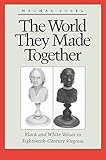The World They Made Together : Black and White Values in Eighteenth-Century Virginia / Mechal Sobel.
Material type: TextPublisher: Princeton, NJ : Princeton University Press, [2021]Copyright date: ©1987Description: 1 online resource (388 p.)Content type:
TextPublisher: Princeton, NJ : Princeton University Press, [2021]Copyright date: ©1987Description: 1 online resource (388 p.)Content type: - 9781400820498
- African Americans -- Virginia -- History -- 18th century
- HISTORY / United States / Colonial Period (1600-1775)
- Accomac courthouse
- Amelia County
- Angola plantation
- Bartram, Benjamin
- Berkeley County
- Calvinism
- Dahomey
- Davenport, Charles
- Gambia
- Halifax County
- Hartwood Baptist Church
- Huguenots
- Igbo
- Ivory Coast
- Jerdone, Sarah Macon
- Jesus
- Jews
- Kentucky
- Kikuyu
- Latitudinarianism
- Lee County
- Louisa County
- Methodism
- Monticello
- Negro Baptist Church
- Petersburg
- abolitionists
- afterlife
- agnosticism
- baptism
- cabins
- carpenters
- celebrations
- childrearing
- cottages
- dialects
- dogtrot house
- earthfast construction
- ecstasy
- excommunication
- festivals
- folk tales
- furniture
- gender roles
- headrights
- inventories
- mammy
- nighttime
- nursemaids
- oral history
- perambulation
- 975.5/00496073 19
- E185.93.V8
- E445.V8
- online - DeGruyter
| Item type | Current library | Call number | URL | Status | Notes | Barcode | |
|---|---|---|---|---|---|---|---|
 eBook
eBook
|
Biblioteca "Angelicum" Pont. Univ. S.Tommaso d'Aquino Nuvola online | online - DeGruyter (Browse shelf(Opens below)) | Online access | Not for loan (Accesso limitato) | Accesso per gli utenti autorizzati / Access for authorized users | (dgr)9781400820498 |
Browsing Biblioteca "Angelicum" Pont. Univ. S.Tommaso d'Aquino shelves, Shelving location: Nuvola online Close shelf browser (Hides shelf browser)

|

|

|

|

|

|

|
||
| online - DeGruyter Laboratory Life : The Construction of Scientific Facts / | online - DeGruyter Origins of the Kabbalah / | online - DeGruyter Partnership and Profit in Medieval Islam / | online - DeGruyter The World They Made Together : Black and White Values in Eighteenth-Century Virginia / | online - DeGruyter Mass and Elite in Democratic Athens : Rhetoric, Ideology, and the Power of the People / | online - DeGruyter Quantum Profiles / | online - DeGruyter On Psychological Prose / |
Frontmatter -- Contents -- List of Illustrations -- Acknowledgments -- Introduction -- Part One. Attitudes Toward Time and Work -- 1. World Views in England and West Africa -- 2. English and African Perceptions of Time -- 3. Afro-American Attitudes -- 4. Shared English and African Experiences of Work -- 5. Anglo-American Attitudes -- 6. Conclusions -- Part Two. Attitudes Toward Space and the Natural World -- 7. African and English Attitudes -- 8. Black and White Visions in and of America -- 9. Sharing Space Inside the Little House -- 10. Sharing Space Inside the Big House -- 11. Naming the Inhabitants -- 12. Conclusions -- Part Three. Understandings of Causality and Purpose -- 13. African and English Explanations of Death and the Afterlife -- 14. The Awakening to the Spirit in Virginia -- 15. The Later Fruits of the Great Awakening -- 16. Attitudes Toward Death and the Afterlife in Virginia -- 17. Conclusions -- Part Four. Coda -- 18. Coherent World Views -- Notes -- Bibliography -- Index
restricted access online access with authorization star
http://purl.org/coar/access_right/c_16ec
In the recent past, enormous creative energy has gone into the study of American slavery, with major explorations of the extent to which African culture affected the culture of black Americans and with an almost totally new assessment of slave culture as Afro-American. Accompanying this new awareness of the African values brought into America, however, is an automatic assumption that white traditions influenced black ones. In this view, although the institution of slaver is seen as important, blacks are not generally treated as actors nor is their "divergent culture" seen as having had a wide-ranging effect on whites. Historians working in this area generally assume two social systems in America, one black and one white, and cultural divergence between slaves and masters.It is the thesis of this book that blacks, Africans, and Afro-Americans, deeply influenced white's perceptions, values, and identity, and that although two world views existed, there was a deep symbiotic relatedness that must be explored if we are to understand either or both of them. This exploration raises many questions and suggests many possibilities and probabilities, but it also establishes how thoroughly whites and blacks intermixed within the system of slavery and how extensive was the resulting cultural interaction.
Mode of access: Internet via World Wide Web.
In English.
Description based on online resource; title from PDF title page (publisher's Web site, viewed 29. Jun 2022)


